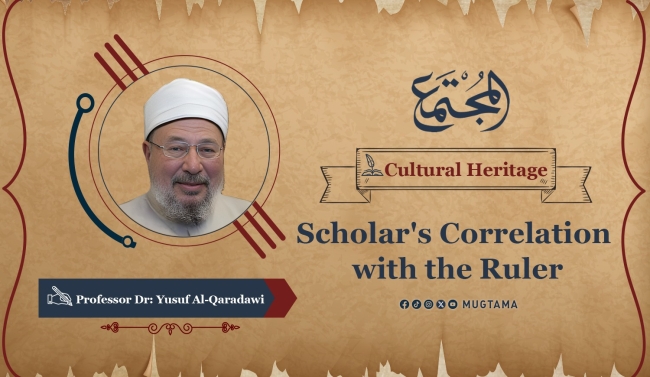Scholar's Correlation with the Ruler
“Al-Mujtama” magazine presented the topic “The relationship between rulers and scholars” for research and discussion. A group of Islamic scholars and thinkers participated in the discussion, to discuss this question about the exemplary relationship between them, trying to extrapolate the defects in this relationship, and exploring the correct practical ways to correct the course of this relationship in our contemporary reality.
Dr.. Yusuf Al-Qaradawi said in response to this question that the relationship between the scholar and the ruler must include advice and clarification in compliance with the words of God Almighty: “And [mention, O Muhammad], when Allah took a covenant from those who were given the Scripture, [saying], "You must make it clear to the people and not conceal it." (Al Imran: 187).
Explaining and advising is the duty of scholars. In the past, the Muslim ruler was a scholar, and the basic principle in Islam is that the ruler should be diligent in knowledge. If that was not the case, he would seek the assistance of scholars, and the scholars should be close to the ruler, guiding him, and giving him fatwas.
Sadly, there was a rift between the scholars and the rulers after that, and the scholar drifted away from the ruler. Even more perilous than that is the possibility that the scholars submit to the ruling class and excuse their transgressions and errors. They receive fatwas from scholars that justify their behavior, regardless of how much it goes against Islam and Sharia. This is a serious error. We state that scholars must be financially independent because of this. In the past, academics possessed private endowments. They were not workers for the government, which had the authority to assign them, sequester them, feed them, or starve them. This is where the error lies.
When one of the Umayyad era princes was asked how they knew Hasan al-Basri was so strong, he replied that it was because they needed his religion and he did not need them. Because of not being needy, he was able to ignore the fact that the ruling class required his religious and intellectual expertise.
The issue is whether the scholars' knowledge is needed by the rulers or if the scholars depend on their material existence to survive on the rulers. Because of this risk, an effort needs to be made to give the scholars their endowments back so they can become self-sufficient.







